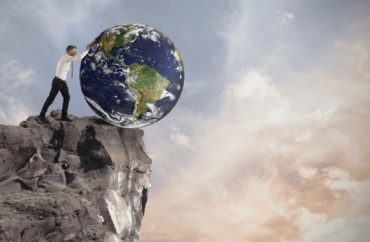
An assistant professor of political science at the University of Massachusetts-Amherst concluded his comparative politics course earlier this month by telling students the planet is dying because of human activity – and there is little hope of reversing course.
“We are in the midst of a sixth mass extinction, one that we are responsible for as a species,” Professor Timothy Pachirat told students on the last day of class. “We humans are creating the conditions for our own extinction as a species.”
He also suggested that because of global warming, students’ granchildren might only be able to see a coral reef in “history books.” He also said the global consumption of farm animals illustrates in part “that we are living in a period of more suffering than the world has ever known.”
The dire predictions were among a long list of apocalyptic warnings the Yale-educated scholar laid out for his students in a 20-minute tangent that mirrored a TED talk in scope. Audio of the professor’s comments were exclusively obtained by The College Fix.
“Here’s the claim: If we accept my wide definition of comparative politics, okay, as the interdisciplinary study of how power works across time and space, then I want to argue the end of the Anthropocene is the single most important political context for the study of comparative politics today,” Pachirat said. “Yeah, I know what is going on with ISIS and ISIL and all that. I am still making this argument.”
The “Anthropocene” is a term used since its coining by Paul Crutzen and Eugene Stoermer in 2000 to denote the present time interval, in which many geologically significant conditions and processes are profoundly altered by human activities.
A student in the class told The College Fix they felt the scholar’s warnings amounted to “an apocalyptic rant about how humankind is going to destroy everything, even ourselves.”
“He made a lot of bold claims, further than the vast majority of green movement members have made, on how the Earth is unrecoverable,” the student said, adding that in general the professor did not inject his extreme views into lectures during the fall semester like he did on the final day.
RELATED — Professor: Cripple the economy to save planet from global warming
Pachirat preceded his comments by acknowledging he was only giving his opinion, and that students would not be tested on the information.
 “I figure you have been with me all semester, you might as well hear at least one lecture where I out and out tell you what I think – and if that makes you nauseous, you should leave now,” he told students before delving into the basis for his global extinction claims.
“I figure you have been with me all semester, you might as well hear at least one lecture where I out and out tell you what I think – and if that makes you nauseous, you should leave now,” he told students before delving into the basis for his global extinction claims.
He began by noting the human population has “exponentially spiked since the industrial revolution … from 350 million to 1 billion to 2 billion to 4 billion to 8 billion and counting.” He also noted fuel consumption since the Industrial Revolution has spiked, “putting carbon back into the air that has been trapped, sequestered underneath the ground for hundreds of millions of years in the form of carbon and oil.”
“Think about this again in terms of geological time,” he told students. “The Earth is 4.6 billion years old. Humans have been around for 200,000 of those 4.6 billion years. The Industrial Revolution, when we humans began excavating and using fossil fuels … that’s only about 200 years old.”
“In geological time the Industrial Revolution represents what percent of the Earth’s history? 0.000004 percent of the Earth’s history,” he continued. “We come back to our UMass example. If UMass is the history of the Earth, and this stage is the period humans have been around, half of the chair you are sitting in is the Industrial Revolution.”
“And yet this Industrial Revolution, this tiny half-chair compared to the enormity of the entire campus, has brought with it widespread and unprecedented extinction of animals and plants, of entire ecosystems and marine systems — caused by human pollution, over harvesting, climate change, habitat loss, habitat fragmentation, monoculture farming, nuclear fallout, river diversion and ocean acidification.”
He cited the Fukushima nuclear disaster as one example of what humans “have been doing on a global scale for the last 200 years.” He went on to suggest humans have encroached on every corner of the Earth and “there is nothing truly wild anymore.”
RELATED — Religious studies professor: Ignoring climate change akin to sin
“And at the same time that all this is going on there is a mass extinction of animal species,” Pachirat said. “We are in an era marked by unprecedented intensification of our exploitation over other species of animals that are in no danger of going extinct because we are reproducing them in order to use them.”
“Farm animals are the most illustrated example, with an estimated 50 billion land animals killed each year worldwide after living lives of immense, unprecedented confinement and suffering,” he continued. “If we use a utilitarian calculus based on the capacity to feel pain, it would be possible to say, based on our treatment of farm animals alone, that we are living in a period of more suffering than the world has ever known.”
He went on to say the future is bleak.
“If we continue with our current levels of pollution and carbon emissions, it’s possible that by the year 2050 — just 35 years from now — the level of carbon dioxide in the atmosphere will exceed 500 parts per million, which is twice the level that existed before the Industrial Revolution,” he said. “And the oceans will have become 150 percent more acidic. We are going to see temperature increases of 3 to 7 percent Fahrenheit, and massive die offs of marine ecosystems, including perhaps most critically coral reefs. Have any of you ever seen a coral reef? It’s possible your children’s children will only be able to look at them in history books – they may no longer exist by the time you have grandchildren.”
“Within 100 years we could see a 52 percent extinction rate since the industrial revolution alone,” Pachirat added. “In other words, we are in the midst of a sixth mass extinction, one that we are responsible for as a species.”
He concluded by saying he hopes students could appreciate his concerns.
“You do not have to be an animal or a plant lover to take this argument seriously,” he said. “You could be the most narcissistic, anthropocentric, selfish jerk on the planet and this issue should still be of interest to you. It’s not inconceivable. Think back again to the Fukushima nuclear power disaster just a few years ago. We humans are creating the conditions for our own extinction as a species.”
The outlook is grim, he added.
“In all honesty I am extremely melancholic about our prospects,” he said of the human race.
In the end, he said that “each of us must justify why we are on this earth, and we too must recognize that we will be judged, we will, by future generations for what we do with our lives in this moment.”
He added that he didn’t have all the answers to the big questions, but he hoped he provoked students to seek them out on their own and impact the world in positive ways.
Click here to hear the professor’s message in its entirety.
RELATED: Prominent professor’s decades of research concludes global warming will not destroy Earth
Like The College Fix on Facebook / Follow us on Twitter






Please join the conversation about our stories on Facebook, Twitter, Instagram, Reddit, MeWe, Rumble, Gab, Minds and Gettr.